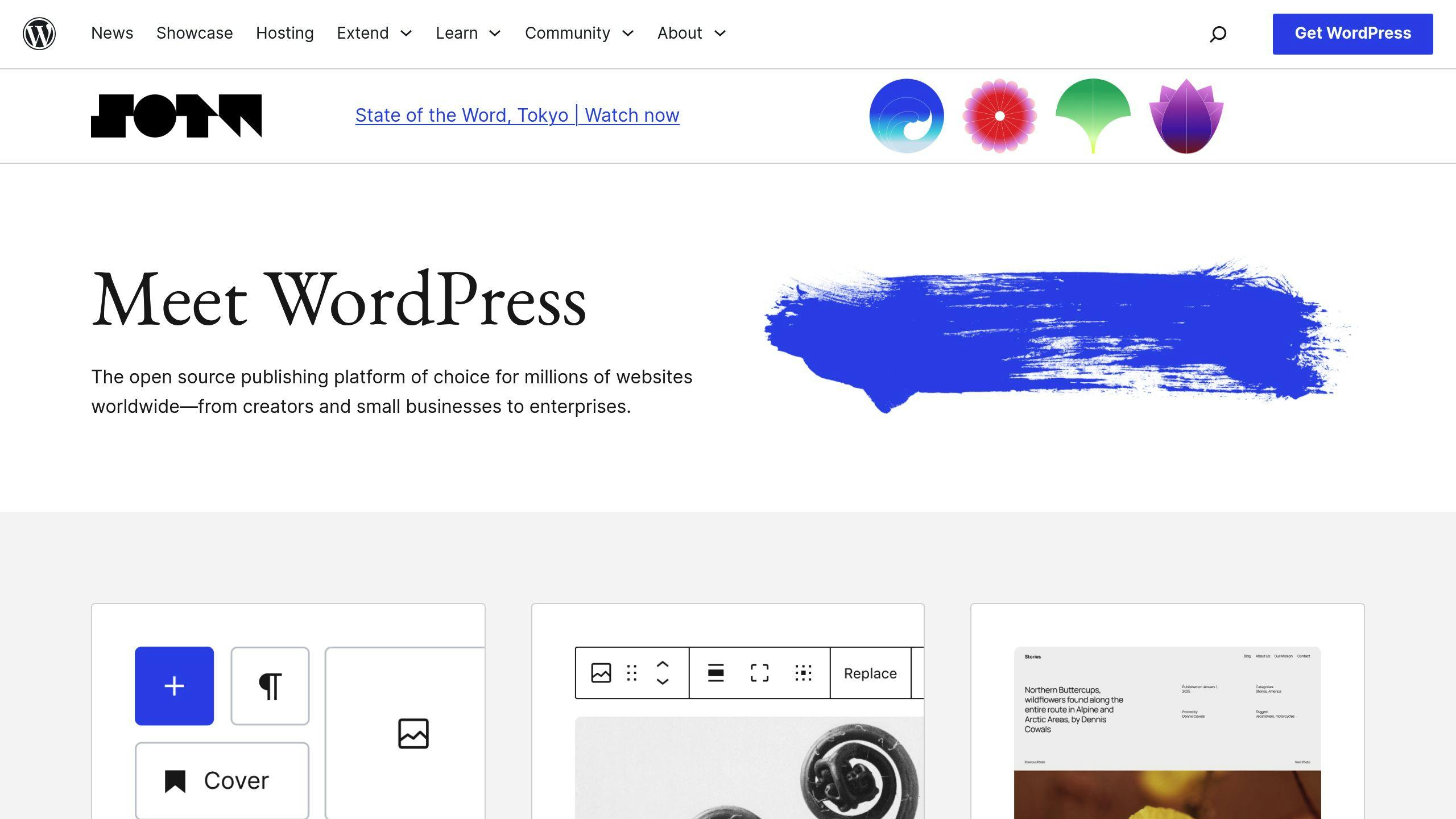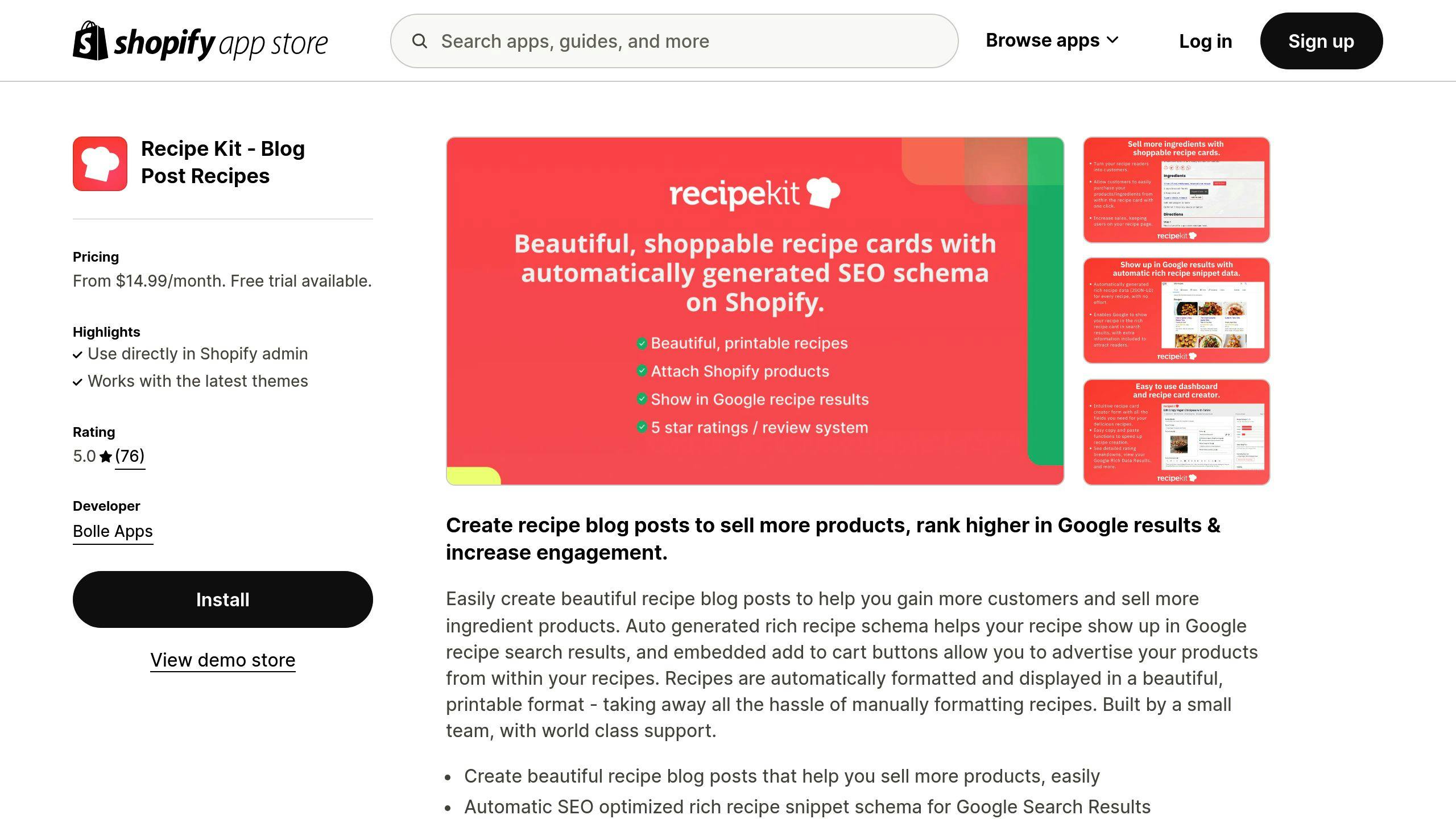If you're a food brand looking to grow online, choosing the right recipe tool is key. Recipe Kit and traditional recipe plugins both help food brands showcase recipes, improve SEO, and engage users. But they cater to different priorities:
- Recipe Kit: Best for Shopify users focused on sales. It offers shoppable recipe cards, automatic SEO, and direct product integration for $14.99/month.
- Traditional Recipe Plugins: Ideal for WordPress users prioritizing content. Tools like WP Recipe Maker provide detailed customization, SEO control, and flexible layouts, often with free and premium options.
Quick Comparison
| Feature | Recipe Kit | Traditional Recipe Plugins |
|---|---|---|
| Platform | Shopify | WordPress |
| SEO | Automatic schema generation | Manual customization |
| E-commerce Integration | Built-in for Shopify | Requires additional plugins |
| Customization | Limited, sales-focused | Advanced, content-focused |
| Pricing | $14.99/month | Free or starts at $49/year |
Bottom Line
- Use Recipe Kit if you're a Shopify-based food brand aiming to boost e-commerce sales.
- Use Traditional Recipe Plugins if you're a WordPress user focused on creating detailed, flexible recipe content.
Top 5 Best Recipe Plugins For WordPress in 2024

Comparing Recipe Kit and Recipe Plugins

Design and Customization Options
Recipe Kit and traditional recipe plugins approach design and customization in distinct ways. Recipe Kit emphasizes streamlined, sales-driven designs with shoppable recipe cards tailored for Shopify stores. It offers four pre-designed templates specifically crafted to convert readers into customers. These layouts are built to drive product purchases directly from recipe pages, making them a great option for brands focused on boosting sales.
On the other hand, traditional recipe plugins like WP Recipe Maker provide more detailed customization options. They allow users to organize recipes with intricate ingredient and instruction categories. This level of control is particularly useful for presenting complex recipes or diverse content formats.
| Feature | Recipe Kit | Traditional Recipe Plugins |
|---|---|---|
| Templates | 4 Shopify-optimized designs | Multiple customizable templates |
| Product Integration | Direct Shopify product embedding | Requires third-party plugin integration |
| Layout Control | Fixed, sales-oriented layouts | Flexible, content-focused customization |
While customization is important, platform compatibility also plays a key role in optimizing workflows.
Platform Integration and Compatibility
Recipe Kit simplifies the process by eliminating the need for additional technical setup. It allows food brands to integrate products directly into recipes with ease, making it efficient for embedding products into blog posts and creating shoppable recipes.
Traditional recipe plugins, however, offer broader compatibility. Primarily designed for WordPress, they can integrate with various themes and e-commerce plugins. For example, WP Recipe Maker pairs well with tools like WP Ultimate Post Grid [2], giving users flexible options for organizing and filtering recipes.
Ease of Use for Food Brands
Recipe Kit is built with simplicity in mind, making it a great choice for small and medium-sized businesses. Its installation is straightforward, with a minimal learning curve, which suits Shopify-based food brands aiming to monetize recipes. Traditional recipe plugins, while requiring more technical setup, offer advanced tools for organization and customization. This makes them a better fit for content-heavy brands. Pricing also varies: Recipe Kit has a fixed $14.99 monthly fee, whereas traditional plugins often come with both free and premium plans, accommodating a range of budgets.
Ultimately, the decision between these tools depends on your platform and primary objectives.
sbb-itb-05158ac
Benefits of Recipe Kit vs Recipe Plugins
SEO Features
Recipe Kit simplifies SEO by automatically generating schema, helping recipes rank higher and appear with rich snippets. This is especially useful for Shopify brands that want better visibility without needing technical know-how.
In contrast, traditional recipe plugins like WP Recipe Maker provide more detailed control over SEO. They let users fine-tune metadata and configure JSON-LD markup, which allows for precise customization of how recipes appear in search results. However, this level of control often requires a deeper understanding of SEO and more time to manage.
| SEO Feature | Recipe Kit | Traditional Recipe Plugins |
|---|---|---|
| Schema Generation | Automatic | Manual configuration needed |
| Rich Snippets | Built-in optimization | Customizable settings |
| Platform Integration | Shopify-specific | WordPress-focused |
| Technical Expertise | Minimal | Moderate to High |
While SEO is great for driving traffic, converting that traffic into sales depends heavily on e-commerce features.
E-commerce Features
Recipe Kit integrates directly with Shopify, making it easy to link products within recipes. Readers can shop directly from recipe pages, creating a smooth and hassle-free shopping experience.
On the other hand, traditional recipe plugins are more focused on presenting recipes than enabling e-commerce. While they can connect with e-commerce platforms using additional plugins, this setup can be more complicated and might not feel as seamless. These plugins shine when it comes to organizing and displaying recipes but don't offer the same built-in sales tools as Recipe Kit.
The way readers interact with recipes also plays a big role in engagement and conversions.
Reader Experience
Recipe Kit is designed with conversions in mind. Its templates guide readers from discovering a recipe to making a purchase, using shoppable recipe cards that look clean and professional while subtly promoting products.
Traditional recipe plugins prioritize content customization. They offer advanced options for organizing ingredients and formatting instructions, which can be ideal for detailed or specialized recipes. However, matching Recipe Kit's shopping integration often requires additional development work.
Ultimately, the choice between these options depends on whether the focus is on integrating direct sales or maximizing content flexibility. Both platforms offer different pricing levels to suit various needs.
How to Choose the Right Tool
For Brands Focused on E-commerce
If you're running a Shopify-based food brand and your main focus is boosting sales, Recipe Kit could be a great fit. Its Business Plan ($22.99/month) includes advanced analytics and AI-powered content tools. These features simplify recipe creation while aligning with your sales goals.
While Recipe Kit is designed with e-commerce in mind, traditional recipe plugins are better suited for those who prioritize content creation and management over sales.
For Bloggers Focused on Content
For food bloggers who care more about creating and sharing recipes than selling products, traditional plugins like WP Recipe Maker are worth considering. These tools offer robust customization options and work well with various content presentation platforms, making them ideal for building detailed and visually appealing recipe collections.
Comparing Costs
When deciding based on cost, think about both the upfront price and the long-term benefits:
| Feature/Plan | Recipe Kit | Traditional Recipe Plugins |
|---|---|---|
| Entry-Level | $14.99/month (Starter) | Free tier available |
| Advanced Features | $22.99/month (Business) | From $49/year |
| Updates & Support | Included | Varies by provider |
Traditional plugins often come with free tiers, which are perfect for bloggers starting out and looking to keep costs low. On the other hand, Recipe Kit’s subscription model is ideal for established brands that rely on recipe content to drive consistent sales.
The decision comes down to your priorities: If you're focused on e-commerce and sales, Recipe Kit’s tools are worth the investment. But if you're aiming to grow a content-heavy blog, traditional plugins provide better flexibility and lower initial costs, even if setup may take a bit more effort.
Conclusion
Key Takeaways
Recipe Kit stands out for Shopify users, offering features like shoppable recipe cards, AI-generated recipes, and analytics under its Business Plan ($22.99/month) [3]. On the other hand, traditional recipe plugins such as WP Recipe Maker emphasize content customization, SEO, and multimedia support, making them ideal for brands focused on content-driven strategies [1][2].
The best choice depends on your brand's specific needs and long-term objectives.
Final Thoughts
For Shopify store owners aiming to monetize recipe content, Recipe Kit's seamless Shopify integration and built-in SEO tools provide an efficient solution. Its ability to turn readers into customers with shoppable ingredient lists makes it a strong option for food brands with an active online store.
If your goal is to create a flexible and detailed recipe library, traditional recipe plugins offer greater customization. Their compatibility with grid plugins for better organization [2] makes them a solid choice for content-focused strategies.
Choose the option that aligns with your goals. If expanding your e-commerce presence is a priority, Recipe Kit's Shopify integration can be a game-changer. But if your focus is on crafting and presenting high-quality content, traditional recipe plugins offer the tools you need.
